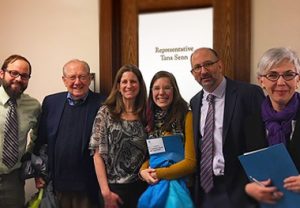
Update: Thank you to everyone who participated in successful advocacy for homelessness prevention and the bills described below. Gov. Jay Inslee has since signed all three of the bills into law.
Washington state affordable housing legislation was the focus for JFS Lobby Day in Olympia on January 31. Seventeen staff, Board Members and volunteers had 19 meetings with representatives and senators to discuss three measures critical to maintaining and increasing affordable housing options.
JFS serves such a wide range of individuals and families, including, domestic violence survivors, people with disabilities, older adults and refugees. With such diverse populations living throughout the Puget Sound region, there is a significant amount of legislation, at all levels of government, that can have a major impact on JFS clients.
The JFS legislative agenda for Olympia was decided through a collaboration between the JFS Government Affairs Committee (GAC) and program staff. It quickly became clear that Washington state affordable housing legislation and funding was the issue that crossed nearly every group of people JFS serves. As Yelena Mushkatina, Russian Language Geriatric Care Manager, said, “Housing is the first step toward stability and healing.”
In determining the agenda, JFS worked closely with the Jewish Federation’s Maxima Patashnik, Government Affairs & Community Relations Senior Manager, to choose the focus legislation and track the progress of bills through the session.
The affordable housing bills the group focused on are listed below, along with their status as of Monday, February 12. You can find information about bills and your legislators’ contact information here.
Source of Income Discrimination
House Bill 2578, Rep. Riccelli / Senate Bill 5407, Sen. Frockt
2578 passed the House, and 5407 passed the Senate.
Both bills have passed their chamber of origin and are waiting for hearings in the opposite chamber.
In the end, only one bill will go to the governor and be signed into law. Reconciliation and negotiations will occur to create one bill.
In most places in Washington state, landlords can categorically deny applications from tenants simply because they use housing subsidies or income support to help pay the rent. This is called source of income discrimination (SOID). It drastically limits options for already vulnerable individuals — domestic violence survivors, people with disabilities, seniors, single parents and veterans — who are trying to find housing on low incomes. SOID can also facilitate opening a legal loophole for racial, religious and other forms of illegal discrimination.
House Bill 2578 and Senate Bill 5407 eliminate housing barriers for renters by making it illegal for landlords to discriminate against applicants solely because of their source of income.
Document Recording Fee
House Bill 1570, Rep. Macri
Passed the House and is waiting for a policy hearing in the Senate.
The document recording fee is a $40 fee paid to file real estate related documents. The fee provides 60 percent of the funding the state uses to combat homelessness. It covers the cost of domestic violence shelters, youth and young adult services, outreach services, rental assistance, permanent supportive housing services and more. Since this fee was implemented in 2006, there has been a 17 percent drop in homelessness statewide.
Currently, the fee will be reduced to $10 in 2019 and fully eliminated by 2023. A fee reduction will result in a loss of $70.5 million in state funding to combat the homeless crisis, causing an estimated 34,000 people to be pushed into homelessness. The current law also requires 45 percent of these funds be used in the private, for-profit rental market only, even though the law allows private landlords to refuse this form of rental payment.
House Bill 1570 eliminates the fee reduction and sunset, preserving funding to address homelessness. The bill also broadens the 45 percent funding requirement to include private, non-profit housing in addition to for-profit. And, it allows cities or counties to expand the fee up to $90, if necessary, to combat local homeless crises.
Aged, Blind or Disabled Program (ABD) and Housing and Essential Needs Program (HEN)
House Bill 2667, Rep. Macri
Passed the House and is waiting for a policy hearing in the Senate.
The Aged, Blind, or Disabled Program (ABD) provides small, cash grants of up to $197 a month to just over 20,000 extremely low-income individuals who are age 65 or older, blind or have a long-term medical condition.
The Housing and Essential Needs Program (HEN) provides non-cash rental assistance and other housing support to vulnerable individuals who have temporary disabilities and are at substantial risk of becoming homeless. HEN helps about 6,700 people a year obtain housing, heat, electricity, natural gas, sewer, garbage and/or water services. The average monthly HEN assistance is equal to about $450 to $500 per month.
Under current law, individuals receiving ABD may not qualify for HEN assistance. When individuals on HEN transition onto ABD they often lose housing and stability, putting them at great risk of becoming homeless. Additionally, individuals whose primary issue is substance abuse disorders are ineligible for HEN and ABD.
House Bill 2667 would allow people receiving ABD grants to become eligible for HEN and would also remove the substance abuse restriction that disqualifies an individual for HEN.



